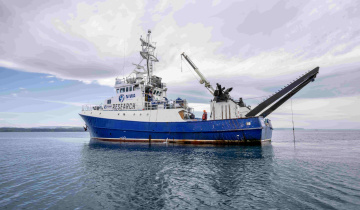If you suspect overfishing is reducing fish numbers, contact DOC or Fish & Game.
The Ministry of Primary Industries manages the commercial take of freshwater quota species such as eels and mullet, while DOC is responsible for native fish in national parks. New Zealand's 12 regional Fish & Game councils are responsible for managing acclimatised fish species (e.g. trout, salmon, perch and tench).
There is no scientific evidence that overfishing of whitebait is limiting the recruitment of galaxiids to streams. NIWA studies found that escapement rates in large rivers such as the Mokau are too high (>70%) for fishing to affect recruitment. This is because in large, wide rivers, whitebait can readily evade nets by swimming in deeper waters away from the bank, especially when flows and water velocities are low.
However, overfishing could occur in some small coastal streams (as against rivers), where there is much less opportunity for whitebait to evade nets. Consult DOC if you suspect overharvest is affecting galaxiid species.
In contrast, there is evidence that eels are overfished in a number of streams, lakes and catchments. In particular, the larger eels (>50 cm long) may be very scarce, especially longfin eels. If so, a moratorium on fishing in the affected stream or catchment may be required. However, the Ministry of Fisheries has little power to restrict cultural or recreational fishing and can only control commercial fishing across a relatively wide area (a commercial fishing zone).
Education and signage may help reduce eel harvesting at specified stream reaches, if this is required. Maori now control eel fisheries and can be consulted if there is a need to limit eel catch.








